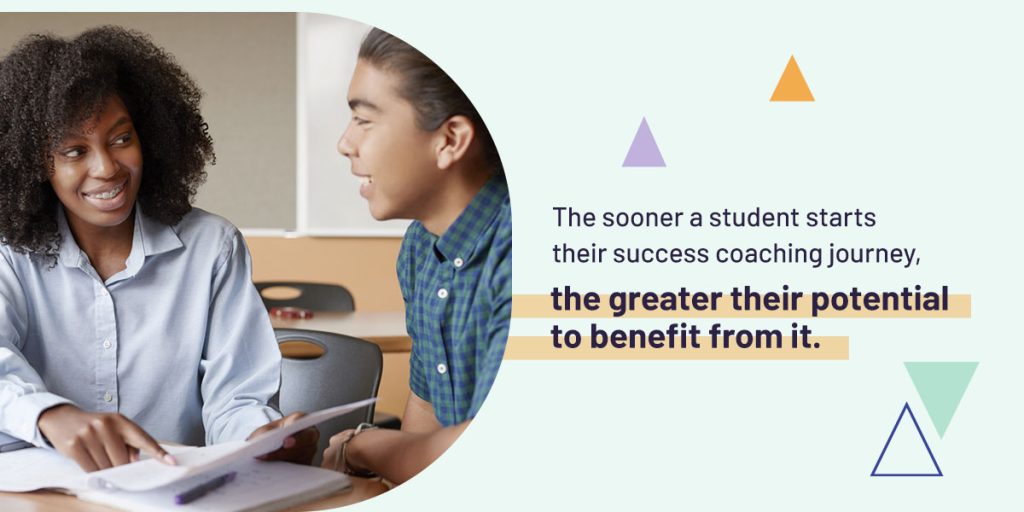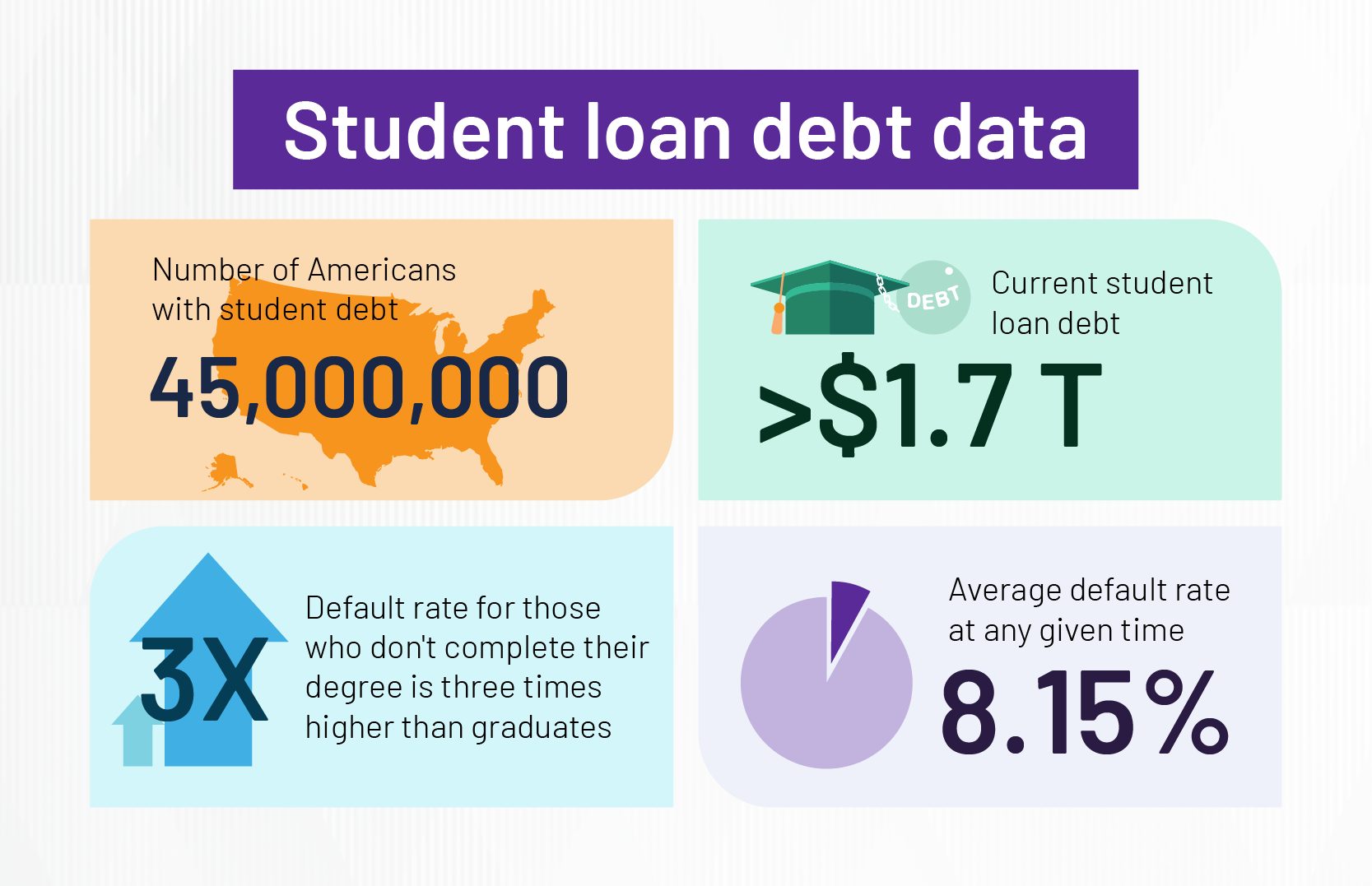
In the pursuit of equity, higher education institutions sometimes overlook the emerging gender disparities that see young men falling behind women in academic attainment. Male students have lower graduation rates than women and earn fewer degrees at all levels of postsecondary education.
These gaps point to a need among young men for more robust support systems to help them realize their academic potential. One of the most effective, proven interventions to improve educational outcomes for young males is the personalized support of a success coach. If your institution aims to start or improve its success coaching program, this guide will provide helpful strategies for coaching young male students to thrive in higher education.
How to identify struggling male students
A major challenge in higher ed success coaching for male students is that those who need help often hesitate to seek it or are unsure where to start. This makes it imperative to identify at-risk students and reach out with proactive support. Signs of struggling male students include:
- Falling grades: When grades dip from one term to the next, a student may be hitting academic obstacles or losing motivation.
- Poor attendance: Excessive absences warn of academic struggles or disengagement. Even if the student has valid excuses, they may need extra help to catch up.
- Lack of participation: Poor participation can signal disengagement, especially if the student becomes more reluctant to interact over time.
- Unfinished tasks: Missing or incomplete assignments often indicate difficulties with comprehension, time management, or external factors impacting the student’s education.
- Financial difficulties: Financial concerns are the leading cause of students dropping out, so supporting those who struggle to pay tuition is urgent.
- Time management problems: Students overwhelmed by their course loads and external responsibilities can benefit from a success coach’s guidance. Black students are the most likely to be in this situation.
- Mental health challenges: Symptoms of depression and anxiety impact 47 percent of students, and feelings of isolation impact 66 percent. Students experiencing these struggles may see their grades suffer or even consider dropping out unless they receive adequate support.
- Reluctance to seek help: A student showing any of the warning signs above and not already engaging relevant support resources is a candidate for early intervention by a success coach.
10 tips for success coaching young men
Higher education success coaching has a strong track record, but some programs produce better results than others. Here are our top 10 tips to help your success coaching program have the greatest positive impact on young men’s learning and life outcomes.
Intervene early

The sooner a student starts their success coaching journey, the greater their potential to benefit from it. Rather than allowing problems to spiral, use the risk factors above combined with predictive and prescriptive analytics to help success coaches meet at-risk students where they are.
Address mindsets
Mindset training is vital to success coaching for young men. Coaches should encourage students to adopt a mindset that is:
- Positive: Rather than seeing courses as burdens to endure along the way to other goals, coaches should help students appreciate the value of the knowledge and skills their studies are honing.
- Growth-oriented: Young men often need guidance to internalize the belief that they can improve in any academic discipline with consistent effort. This requires dropping the assumption that strengths and weaknesses are fixed, which often results in pressure to prove themselves and severe self-esteem issues when facing academic challenges.
Balance compassion and challenge
Young men need a balance of challenge and compassion. On the one hand, coaches should convey that the student is capable of achieving challenging goals. On the other hand, success coaches must show empathy toward the student’s struggles, offering constructive feedback and emotional encouragement when setbacks occur.
See the whole student
Many male students struggle to see how their academic success relates to their mental and emotional well-being, physical health, and balance of other responsibilities. A good success coach helps young men progress as whole individuals by taking all these factors into account and referring the student to resources like:
- Financial aid
- Mental health counseling
- Child care
- Health and fitness clubs
- Academic advising
- Tutoring
Empower goal setting
When success coaches help young men build goal-setting skills, those young men become more engaged in their academic journeys. Coaches help students craft goals that are specific, measurable, achievable, relevant, and time-bound (SMART), break these down into smaller objectives, and celebrate the wins along the way.
Maintain consistent relationships
Where feasible, maintain student-coach pairings throughout a young man’s education. This allows the coach to understand the student’s circumstances, strengths, and improvement opportunities better while enabling the student to develop trust and communicate openly. One study found that minority male students with the same success coach throughout their program were 12 percent more likely to graduate.
Prioritize institutional buy-in
Young men realize better results from success coaching programs with significant institutional buy-in, especially among faculty. Institutions can use webinars and advertising to spread positive messaging about their success coaching programs, but advocacy by male role models among faculty can be particularly persuasive. The First in the World (FITW) study exploring the impacts of success coaching found that coaching programs with institutional buy-in achieved a 9 percent increase in credential completion, compared to a 4 percent increase in the full sample group.
Promote inclusivity
Minority males are more likely than other young men to face discrimination, financial challenges, and a lack of academic role models. This makes these students key candidates for success coaching. Success coaches should have the training to address the distinctive challenges minority males face with sensitivity. Recruiting diverse coaches can help make success coaching programs more inclusive.
Harness feedback
Use student surveys to gather feedback about:
- Whether students are aware of the success coaching program and how to access it.
- What they do and don’t like about the program if they participate in it.
- Why nonparticipating students choose to leave or not to join the program.
Analyzing and implementing this feedback can help develop a more effective success coaching program for young men.
Leverage technology
Combining the experience of a skilled coach with the efficiency of data-driven student support software can produce optimal success coaching results for your institution’s young men. A landmark study saw a 22.4 percent increase in minority male student retention when taking a technology-enabled approach. Technology-enabled success coaching involves the coach using software to flag at-risk students, schedule appointments, and personalize their coaching based on student data.
Enhance success coaching for young men with Watermark

Blending success coaching with institutional buy-in and innovative software is a potent recipe for student success, especially for the young men who need support most. With Watermark Student Success & Engagement, you can empower your institution’s young men to thrive.
This data-driven student success solution can help your institution:
- Identify struggling students based on predictive analytics.
- Support mobile-friendly scheduling for coaching sessions.
- Build personalized success pathways based on student goals and monitor progress.
Request a demo of Student Success & Engagement today to see how our technology can enhance student success coaching at your institution.
































































































































































































































































































































































































